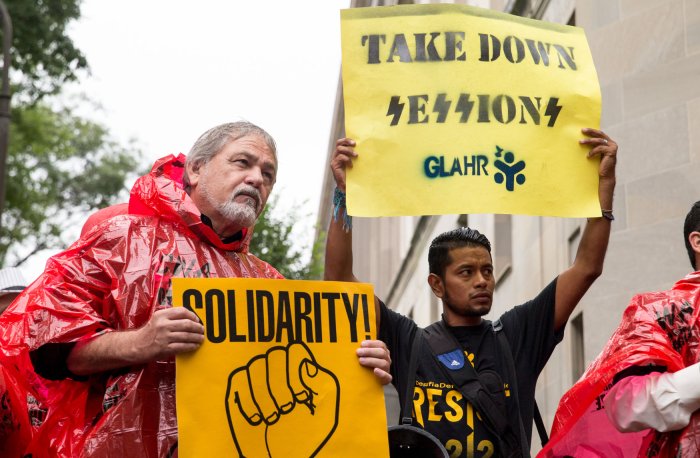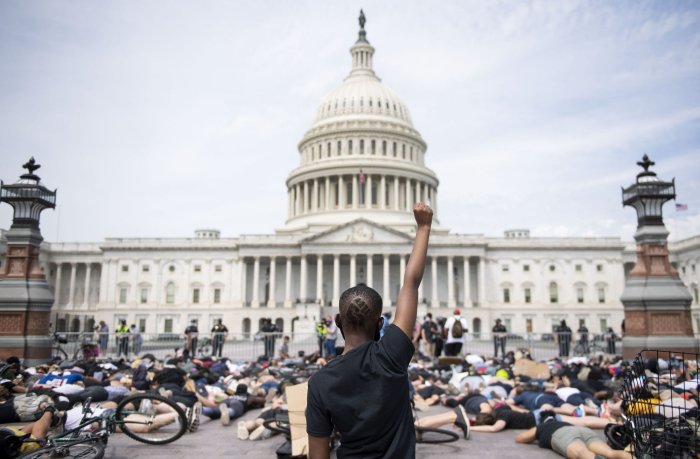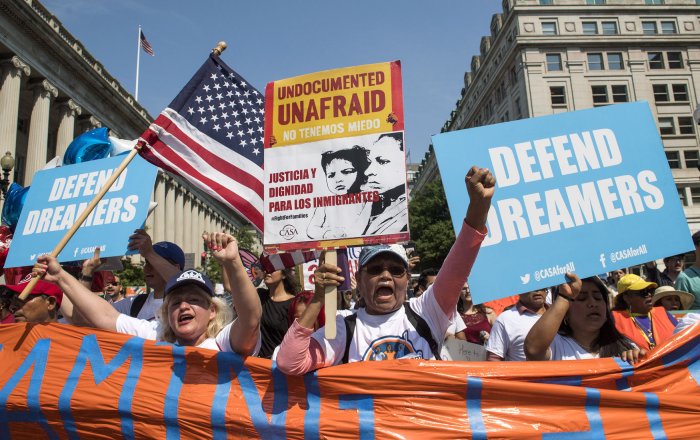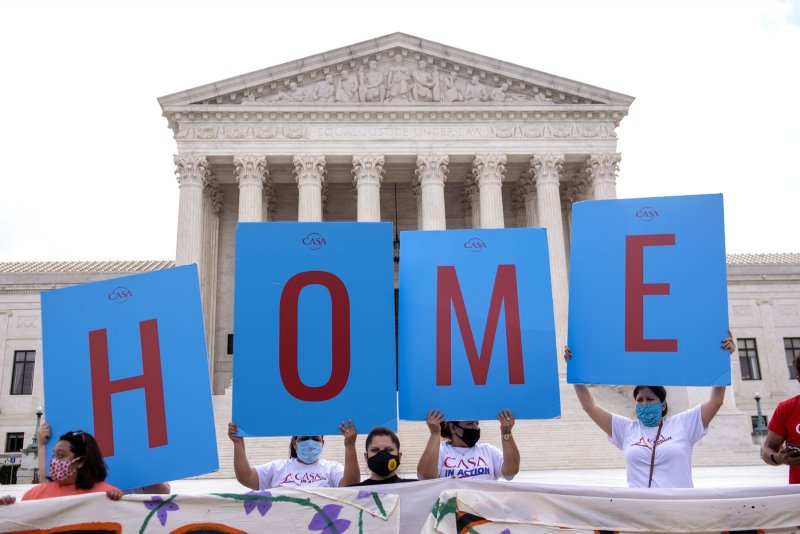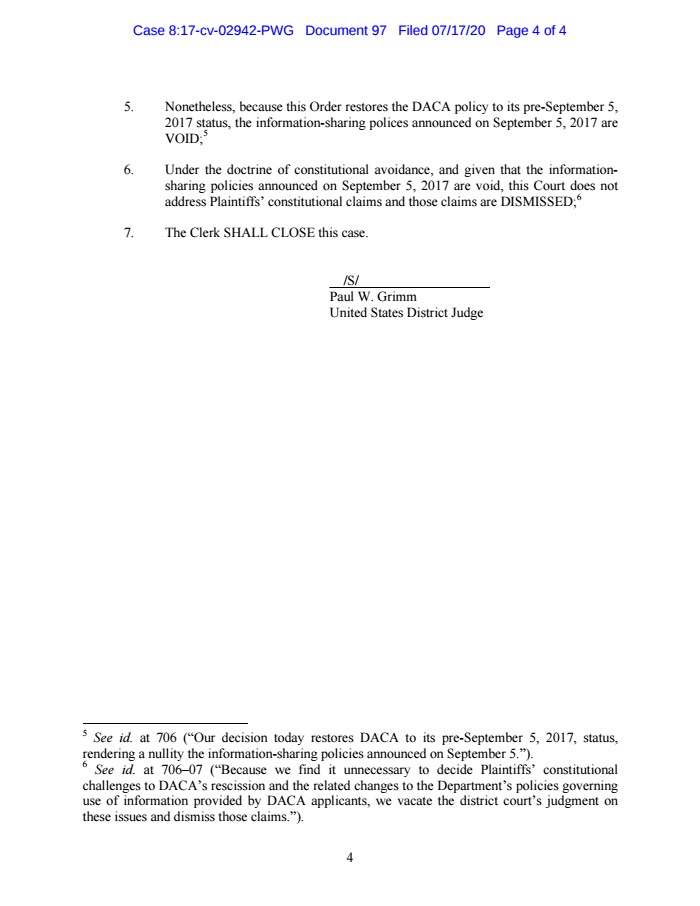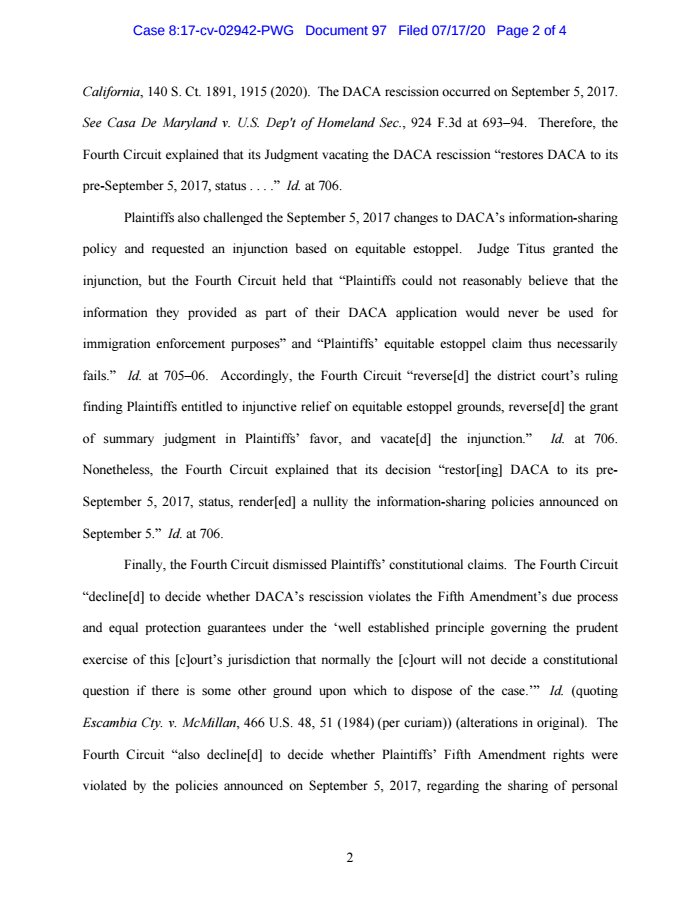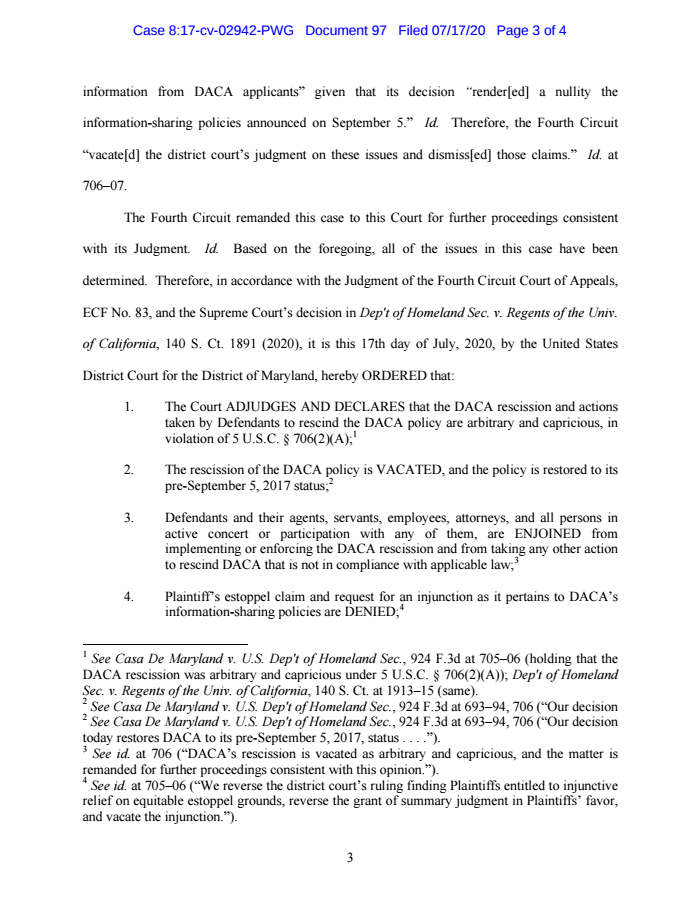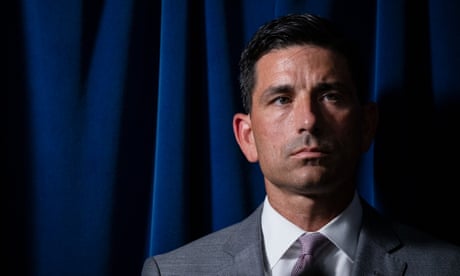Young immigrants who have been shut out of DACA point to the program's success in an attempt to garner bipartisan support for "a path to U.S. citizenship."
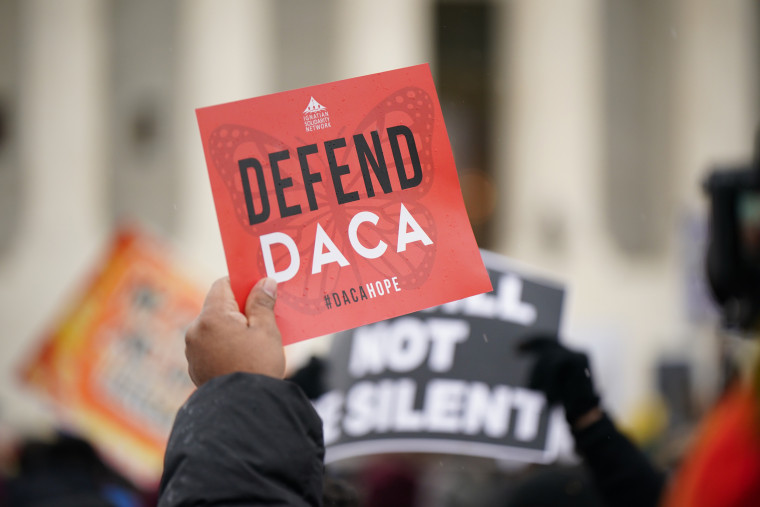
May 8, 2024,
By Nicole Acevedo
As immigration policies take center stage in the nation’s political debate and the fate of the Deferred Action for Childhood Arrivals program remains uncertain, senators are holding a hearing Wednesday on the "urgent need to protect immigrant youth," according to the Senate Judiciary Committee.
The occasion has prompted 1,636 scholars and alumni of TheDream.US, an organization helping DACA recipients and other undocumented immigrant youths known as Dreamers go to college, to sign a letter urging Congress to "provide us with the opportunity to pursue a path to U.S. citizenship naturalization."
"Such action will provide certainty to our families and communities and strengthen our nation’s economy by ensuring the future of a vital, vibrant workforce," the letter, first shared with NBC News, reads.
Other organizations such as evangelical and educational groups have also shared letters of support ahead of the hearing.
Gaby Pacheco, an education leader and president of TheDream.US, is one of five witnesses expected to speak at the hearing. She will be advocating for legislation that would give a pathway to legalization to young immigrant adults who've spent most of their lives in the U.S., something that polls have shown has broad support.
"The reality is that more than ever, without bipartisanship, we're not going to be able to get anything done," Pacheco told NBC News in a phone interview ahead of her testimony.
But achieving the much-needed bipartisanship may be more challenging now than ever before, said Pacheco, a former DACA recipient who has advocated for Dreamers her entire life.
Sen. Dick Durbin, D-Ill., chairman of the Judiciary Committee, opened the hearing focusing on the contributions of Dreamers and DACA recipients. Sen. Lindsey Graham, R-S.C., the ranking member, responded saying that fixing DACA “is not my concern right now” because his priority is solving the “complete, utter disaster” riddling the border and U.S. immigration policies.
Graham added that legalizing Dreamers sends others the message “to keep coming” and will worsen the current immigration crisis.
The senators’ differing stances are a departure from their bipartisan efforts just a year ago when they both introduced the Dream Act of 2023, which would have allowed Dreamers to earn lawful permanent residence.
Immigration has increasingly become a flashpoint for politicians on both sides of the aisle ahead of the November presidential election, with Republicans overwhelmingly pointing to selected instances of undocumented noncitizens charged with murder and other serious crimes to push for hard-line immigration policies, while Democrats decry such efforts and deem them “cheap” political tactics.
According to the National Institute of Justice at the Justice Department, “Recent research suggests that those who immigrate (legally or illegally) are not more likely, and may even be less likely to commit crime in the US.”
“I think it’s very sad and tragic, what happens in the country when a very small, tiny population that does bad things is now put front stage to scare everyday Americans about who immigrants are,” said Pacheco, who has been in the U.S. since she was 8, after emigrating from Ecuador with her family.
Such dynamics are reflected in the pool of witnesses testifying before the Senate, which includes Tammy Nobles, the mother of slain 20-year-old Kayla Hamilton who sued the federal government in January alleging it allowed a gang-affiliated undocumented teen charged with Hamilton's killing into the country.
More than 800,000 young adults who were brought to the U.S. as children and lack legal immigration status have been able to work and study without fear of deportation since DACA was first implemented in 2012 as an executive action by then-President Barack Obama. An overwhelming majority of DACA recipients were born in Mexico and other Latin American countries.
Then-President Donald Trump tried to shut down the program, though he was stopped by the courts. A series of lawsuits challenging DACA spearheaded by Republican-led states continue making their way through the courts.
An estimated 400,000 young people who would have been eligible to apply for DACA have been shut out of the program since 2021, when a federal judge decided to halt the program for new registrants amid the ongoing legal challenges.
In addition to Nobles and Pacheco, the other witnesses include Mitchell Soto-Rodriguez, a police officer in Illinois who has DACA, and two immigration policy experts.
Irving Hernandez, 20, one of the hundreds of TheDream.US scholars and alumni who signed the organization's letter to Congress, is among those who have been shut out of DACA in recent years.
A junior at Metropolitan State University of Denver, Hernandez is studying health psychology and aspires to have a career helping people dealing with anxiety, depression, trauma and other mental health challenges.
"I want to be such a huge catalyst for change," he said.
Hernandez said he wants lawmakers to "give Dreamers the opportunity to succeed, because we really don't get that opportunities."
Supporters of DACA say it’s one of the most successful policies for immigrant integration.
Since DACA started in 2012, recipients have contributed $108 billion to the economy, as well as $33 billion in combined taxes, according to FWD.us, a bipartisan group supporting immigration reform. Most DACA recipients are young adults who have lived in the U.S. for more than 16 years.
Pacheco, a longtime advocate trying to bridge the political divide on Dreamer legislation, recalled testifying at a congressional hearing over a decade ago, shortly after she became a DACA recipient. Now sitting in front of senators as someone who was able to become a naturalized U.S. citizen after she was sponsored by her husband, Pacheco said she hopes to convey her life story to them, show the success of the DACA program and put a spotlight on the immigrant youth who have been shut out of the program.
IMMIGRATION
Democrats urge Biden to act on immigration as Trump threatens deportations
More than 80 lawmakers sent Biden some concrete ideas as his administration considers executive actions to address U.S. border crossings.
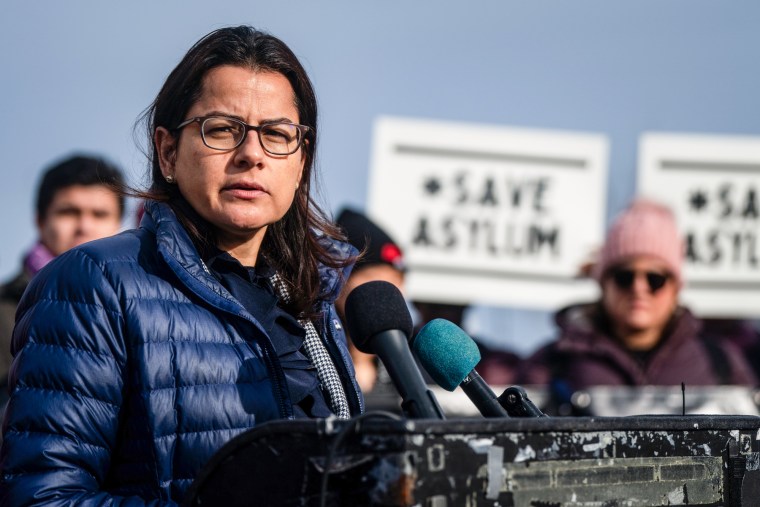
May 8, 2024,
By Julie Tsirkin
WASHINGTON — Immigration advocates and Democratic lawmakers are urging President Joe Biden to prioritize long-term undocumented immigrants as his administration weighs executive actions to curb record crossings along the southern border.
In a letter signed by more than 80 lawmakers, including members of the Congressional Hispanic and Progressive caucuses, the Democrats ask Biden to “take all available actions to streamline pathways to lawful status for undocumented immigrants” ahead of the November election.
”Deporting all such individuals — as former President Donald Trump has threatened to do if reelected — would devastate the American economy and destroy American families,” they added.
The letter offers concrete steps they say the White House could take, including streamlining the process by which DACA recipients, or undocumented immigrants brought to the country as children, can seek to change to a non-immigrant status.
Arizona Sen. Kelly says immigration is the ‘most frustrating’ issue of his ‘adult life’
Lawmakers also ask Biden to unify families by allowing undocumented migrants married to U.S. citizens to seek parole on a case-by-case basis and reduce processing times for green card cases so that those migrants could be eligible to work.
The chair of the Hispanic Caucus, Rep. Nanette Barragan, D-Calif., said in a statement that Biden “should seize this critical moment by exercising his Executive Authority to rebuild our broken immigration system.”
“We urge him to provide pathways to citizenship and protections for the millions of long-term undocumented residents who have contributed to the rich fabric of the United States,” she said.
The new push follows a letter in March from Senate Democrats, led by Judiciary Committee Chair Dick Durbin, D-Ill., and Immigration Subcommittee Chair Alex Padilla, D-Calif., outlining the same call to action.
”As the Biden administration considers executive actions on immigration, we must not return to failed Trump-era policies aimed at banning asylum and moving us backwards,” Padilla told NBC News in a statement.
On Monday, NBC News reported that Biden is considering using his executive authority in the coming weeks to potentially restrict the number of migrants who can enter the U.S.
The administration has been in touch with immigration advocacy groups ahead of any executive order.
A Department of Homeland Security official with knowledge of the discussions said the White House would most likely invoke power reserved for the president in Section 212(f) of the Immigration and Nationality Act, which allows a president discretion over who is admitted into the U.S.
Under that authority, Customs and Border Protection would be directed to block the entry of migrants crossing over from Mexico if daily border crossings passed a certain threshold. It’s similar to a provision of the border bill negotiated by a bipartisan group of senators earlier this year, which was killed by Republicans, in part, at Trump’s urging.
Advocates are worried that the policy would be too restrictive on asylum, as are some Democrats who opposed the bill in February and called for a legal pathway to citizenship for undocumented people in the U.S. to be included in the text.
Members of the Congressional Hispanic Caucus lobbied the administration over months to no avail, with Democratic leadership eventually giving up its long-held red line on immigration reform to unlock aid to Ukraine amid a Republican blockade.
The GOP rejected the bipartisan compromise regardless, effectively sinking all near-term prospects for Congress to tackle an issue that has plagued the U.S. government for years.
Nonetheless, Padilla said this is Biden’s “opportunity” to “provide relief for the long-term immigrants of this nation.”
The California Democrat is leading a press conference Wednesday afternoon with lawmakers and advocates from FWD.us, American Families United, UnidosUS and CASA to spotlight the letter to Biden.
The president of FWD.us, an immigration advocacy group, said in a statement that most Americans “don’t have the opportunity to improve the lives of hundreds of thousands of American families — but President Biden does.”
”He has the legal authority to provide affirmative relief to the spouses of U.S. citizens, and other longtime undocumented community members,” Todd Schulte said. “We hope, and believe, he will act soon to protect these American families.”


